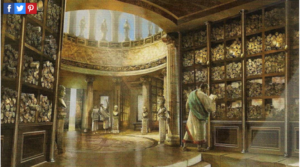Introduction:
The Library of Alexandria stands as one of the greatest symbols of intellectual pursuit in the ancient world. Located in the city of Alexandria, Egypt, this magnificent library was home to a vast collection of knowledge and became a hub for scholars, philosophers, and scientists to exchange ideas. Join us as we delve into the concept of the Library of Alexandria, uncovering its origin, significance, and unfortunate demise.

The Birth of an Intellectual Haven:
Founded in the 3rd century BCE by Ptolemy I Soter, a general under Alexander the Great, the Library of Alexandria aimed to collect and preserve knowledge from across the known world. Ptolemy I Soter envisioned a grand institution that would house a copy of every book ever written. Thus, it became a fundamental center for scholarship and intellectual exploration.
A Beacon of Knowledge:
The Library of Alexandria quickly garnered fame throughout the ancient world for its unmatched collection. It served as a cultural melting pot, drawing countless scholars, philosophers, and scientists from all corners of the globe. This institution aimed to gather texts from various fields, including mathematics, astronomy, medicine, literature, and philosophy, making it the epitome of comprehensive knowledge.
The Philosophical and Scientific Advancements:
Within the Library’s walls, numerous intellectuals developed groundbreaking scientific and philosophical ideas. Pioneers such as Euclid, the father of geometry, Archimedes, renowned for his inventions and discoveries, and Aristarchus of Samos, who proposed the heliocentric model of the solar system, graced the Library with their contributions. The exchange of ideas and knowledge fostered by the Library accelerated humanity’s intellectual progress.
The Tragic Demise:
Despite its significance, the Library of Alexandria sadly met a tragic fate. Throughout the centuries, it faced various challenges, including fires, conquests, and religious conflicts. The destruction of the Library is often attributed to a combination of events, including the Roman conquest of Egypt and subsequent fires, resulting in an irretrievable loss of countless precious texts. While the specific details surrounding its demise remain unclear, its legacy continues to resonate through history.
Significance in Modern Times:
Though the physical library no longer exists, the concept and legacy of the Library of Alexandria continue to inspire. It symbolizes the pursuit of knowledge and the importance of preserving and sharing wisdom for future generations. Modern institutions, such as libraries, research centers, and universities, strive to emulate its mission by collecting, preserving, and disseminating knowledge.
Conclusion:
The Library of Alexandria remains an enigmatic chapter in human history, representing the relentless quest for knowledge and advancement. Its tragic demise serves as a reminder of the importance of cherishing and protecting intellectual pursuits. Through the centuries, its legacy continues to inspire scholars, facilitating progress and shaping our understanding of the world. The Library of Alexandria will forever be an ancient wonder that captivates the imagination of those who seek to explore the depths of human intellect.

